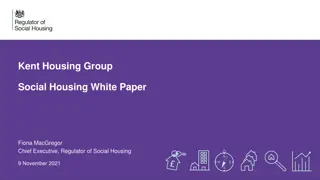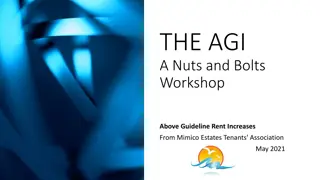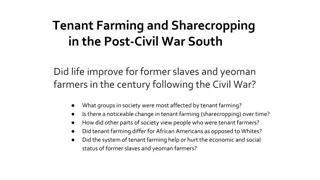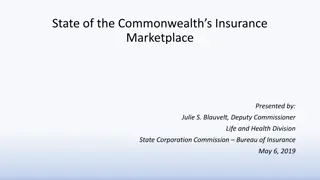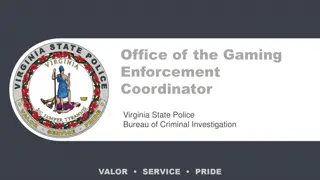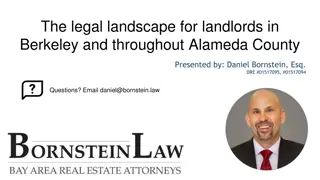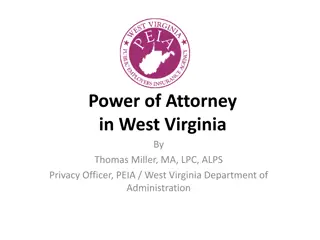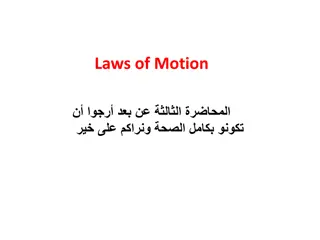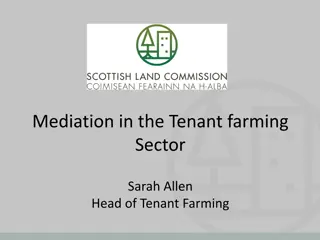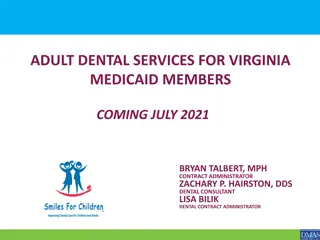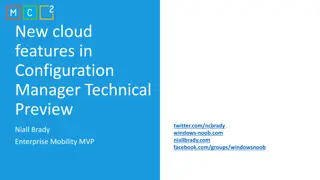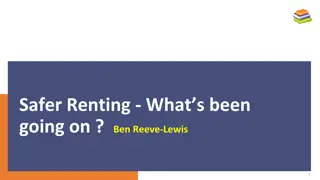New Tenant-Friendly Laws in Virginia - July 2019
Virginia has introduced new laws aimed at providing more protection and clarity for tenants, addressing issues such as written leases, eviction processes, and affordability. These changes seek to tackle the high eviction rates in various cities and factors such as poverty, unfavorable laws, and gentrification. The reforms include mandatory written leases, limitations on eviction filings, and efforts to improve tenant rights and living conditions.
Download Presentation

Please find below an Image/Link to download the presentation.
The content on the website is provided AS IS for your information and personal use only. It may not be sold, licensed, or shared on other websites without obtaining consent from the author.If you encounter any issues during the download, it is possible that the publisher has removed the file from their server.
You are allowed to download the files provided on this website for personal or commercial use, subject to the condition that they are used lawfully. All files are the property of their respective owners.
The content on the website is provided AS IS for your information and personal use only. It may not be sold, licensed, or shared on other websites without obtaining consent from the author.
E N D
Presentation Transcript
7 NEW LAWS THAT ARE MORE FAIR, FAVORABLE AND FRIENDLY TO TENANTS (Starting July 1, 2019) Martin Wegbreit, Esq., Director of Litigation Central Virginia Legal Aid Society 101 West Broad Street, Suite #101 Richmond, VA. 23220 804-200-6045 (V) & 804-649-8794 (F) marty@cvlas.org (E-mail)
The Virginia eviction crisis & its causes Virginia has five of the top ten highest eviction rates among large U.S. cities: #2 Richmond (11.44%) #4 Newport News (10.23%) #10 Chesapeake (7.9%) #3 Hampton (10.49%) #6 Norfolk (8.65%) Virginia has three of the top five highest eviction rates among mid- size U.S. cities: #2 Petersburg (17.56%) #5 Portsmouth (15.07%) #4 Hopewell (15.69%) 2
The Virginia eviction crisis & its causes Lack of affordable housing 1. 2. 3. 4. Poverty Unfavorable landlord-tenant laws Archaic legal terminology 5. 6. 7. Relatively higher cost of living Gentrification Foreclosure aftermath 8. 9. 10. Relatively little support for tenants Older housing stock Relatively lower wages 11. Five years without Medicaid expansion 12. Government sponsored segregation 3
2016 Richmond Eviction Map 1937 Richmond Residential Security Map 4
(1) Written Leases Required - 55-248.7 Current law - lease may be oral or written. Oral lease leaves both landlords and tenants uncertain about rights and duties. Starting July 1, 2019, landlords must offer written leases. If landlord does not do that, the law sets out a specific lease that will apply. This lease has these rules: 6
(1) Written Leases Required - 55-248.7 The lease is 12 months with no automatic renewal. Rent is paid in 12 monthly payments. Rent is due on the first of the month and late after the fifth of the month. A reasonable late fee may be charged. The security deposit can be no more than two months rent. The landlord and tenant still may enter into a written lease. 7
(2) One Case at a Time and Required Evidence - 8.01-126 Current law - landlord may file unlawful detainer (eviction) lawsuit due to nonpayment of rent for each month rent claimed to be overdue. Even if prior lawsuits are still undecided. Increased fees multiple court filing fees, and multiple attorney fees if an attorney is involved. 8
(2) One Case at a Time and Required Evidence - 8.01-126 Starting July 1, 2019, if nonpayment of rent is the only issue, a landlord may file only one lawsuit at a time. On request of landlord, judge must allow lawsuit to be amended to cover all rent and fees claimed as of the trial date. 9
(2) One Case at a Time and Required Evidence - 8.01-126 Current law - landlord not required to have the court admit into evidence the notice that terminated the tenancy. Many tenants do not know the exact reason the landlord wants to evict them. 10
(2) One Case at a Time and Required Evidence - 8.01-126 Starting July 1, 2019, to get judgment of possession and start the Sheriff s eviction process, landlord must present court with a proper termination notice that the court enters into evidence. Failure to do so may be grounds to set aside a judgment of possession. 11
(3) Pilot Eviction Diversion Program 55-248.40:1, 55-248.40:2 Current law - in nonpayment of rent case, tenant must pay all amounts due as of court date, no later than the court date, to avoid a judgment of possession. Judgments of possession stay on a tenant s record for ten years. Barrier for future rentals even if tenant later pays current and is able to stay. 12
(3) Pilot Eviction Diversion Program 55-248.40:1, 55-248.40:2, 55-248.40:3 Starting July 1, 2020, tenants in Richmond, Petersburg, Hampton, and Danville eligible for a mandatory pilot Eviction Diversion Program (EDP). Tenants must meet these rules: Nonpayment of rent is the only issue between landlord and tenant. Tenant comes to court on return date and asks to be in the EDP. Landlord and tenant agree on the amount due on the return date. On or before return date, tenant has paid the landlord or the court at least 25% of the amount due on the return date. 13
(3) Pilot Eviction Diversion Program 55-248.40:1, 55-248.40:2, 55-248.40:3 Tenants must meet these rules (continued): Tenant testifies he or she has sufficient funds to make payments under the EDP. Tenant testifies why he or she fell behind in rent. In past 12 months, tenant not been late in rent more than two times in a 6 month period or more than three times in a 12 month period. Tenant not used the right of redemption had an unlawful detainer dismissed by paying current in the last 6 months. Tenant not participated in an EDP in the last 12 months. 14
(3) Pilot Eviction Diversion Program 55-248.40:1, 55-248.40:2 Court-ordered payment plan: Payments to landlord by cashier s check, certified check, or money order. Received or before the 5th day of each month included in the plan. 1st payment is 25% of the amount due the month following the return date. 2nd payment is 25% of the amount due the 2nd month following the return date. 3rd payment is 25% of the amount due the 3rd month following the return date. 15
(3) Pilot Eviction Diversion Program 55-248.40:1, 55-248.40:2 Ongoing rent paid by tenant within 5 days of the due date set by the lease. If the tenant makes all payments as required by the payment plan, lawsuit dismissed. If not, the landlord may seek a judgment of possession. Tenant may participate in an EDP only once in any 12 month period of time. 16
(4) Tenant Attorneys Fees in Poor Housing Cases - 55-248.25 & 55-248.27 Current law - landlords usually may claim attorney s fees under the lease or by statute. Tenants have very few ways to do this. Landlords can use the threat of attorney s fees in litigating with tenants. Starting July 1, 2019, attorneys who represent tenants and who win two types of cases involving poor housing conditions can get attorney s fees. 17
(4) Tenant Attorneys Fees in Poor Housing Cases - 55-248.25 & 55-248.27 Tenant s Assertion: Must be current in rent and stay current. Must give notice to landlord, or have someone else do so, of the poor housing conditions. Must wait a reasonable period of time before filing. Tenant pays next month s rent into court and files a Tenant s Assertion. If tenant wins lawsuit, tenant s attorney may get attorney s fees. 18
(4) Tenant Attorneys Fees in Poor Housing Cases - 55-248.25 & 55-248.27 Defense to eviction for nonpayment of rent: Landlord must have been given notice of poor housing conditions by tenant, or someone else on behalf of tenant, before the eviction lawsuit was filed. Tenant, if in possession, must pay unpaid rent into court. If tenant wins lawsuit, tenant s attorney may get attorney s fees. 19
(5) Extended Right of Redemption - 55-248.34:1 Current law - tenants get three chances to pay rent late and stay, ending on the court date. Starting July 1, 2019, they will have a fourth and later chance. 1st chance is within any grace period of lease. If pay rent within grace period, tenant gets to stay. Tenant may do this any number of times. 2nd chance is after grace period ends and before landlord has filed an eviction lawsuit. If pay rent and late fee during this period, tenant gets to stay. Tenant may do this any number of times. 20
(5) Extended Right of Redemption - 55-248.34:1 3rd chance is after landlord has filed eviction lawsuit and on or before the court date. This is a redemption (pay and stay), or a redemption tender (offer to pay and stay). Redemption - eviction lawsuit must be dismissed as paid if tenant pays all amounts owed as of the court date. All rent (including a new month s rent if that has come due). All late fees set forth in a written lease (including a new month s late fee if that has come due). Court costs. Reasonable attorney s fees (if a landlord s attorney is involved). 21
(5) Extended Right of Redemption - 55-248.34:1 Redemption Tender - tenant comes to court on first court date and shows judge a written commitment from govt. or non-profit agency to pay all or part of redemption amount. Judge must postpone case ten days and allow tenant to come back with the full redemption amount. If so, case is dismissed as paid. If not, landlord gets an order of possession. Tenant may do a redemption, or a redemption tender, only once in any 12 month period of time that the tenant continues to live in the same place. 22
(5) Extended Right of Redemption - 55-248.34:1 Starting July 1, 2019, tenants will get a fourth and later chance to pay rent late and stay. If judge decides in landlord s favor, a judgment of possession is entered. Landlord may ask the court to issue a writ of eviction, which goes from the clerk to the Sheriff to the tenant, and authorizes Sheriff to evict on a specific date. Extended right of redemption - tenant can pay the landlord, the landlord s attorney, or the court all amounts owed as of two business days before the Sheriff s scheduled eviction date. 23
(5) Extended Right of Redemption - 55-248.34:1 Payment by cashier s check, certified check, or money order. All rent (including a new month s rent if that has come due). All late fees set forth in a written lease (including a new month s late fee if that has come due). Court costs and Sheriff s fees. Reasonable attorney s fees (if a landlord s attorney is involved). If so, Sheriff s eviction cancelled. Tenant may do a redemption, a redemption tender, or an extended redemption only once in any 12 month period of time that the tenant continues to live in the same place. 24
(6) Use Writ or Lose Writ - 8.01-470 & 8.01-471 Current law - judgment of possession can be used for up to 12 months before getting writ of eviction. Hangs over tenant even if all rent been paid current and tenant is following the lease. Starting July 1, 2019, time shortened to six months. Both landlord and tenant have greater certainty. 25
(6) Use Writ or Lose Writ - 8.01-470 & 8.01-471 Current law - writ of eviction not executed by Sheriff simply expires after 30 days. Landlords do not know whether tenant actually was put out by the Sheriff. Starting July 1, 2019, writ of eviction not executed by the Sheriff is vacated. Tenants who work things out with their landlord will have the writ removed from their tenant record and not be a blemish. 26
(7) Access to Appeal - 16.1-107 Current law to appeal an eviction judgment based on nonpayment of rent, the tenant must post an appeal bond: For the amount of the money judgment for rent, and For up to 12 months future rent in advance (usually courts require 3-4 months future rent). Appeal bond must be posted within ten days of judgment. Starting July 1, 2019, tenant still must post an appeal bond for the amount of the money judgment for rent, within ten days of judgment. After that, the tenant pays ongoing rent as it becomes due. 27
Tips to Avoid Eviction 1) Read & understand your lease before you sign & save it 2) Do not move just because your landlord says so 3) Promptly read all notices from landlord & save a copy 4) Answer in writing all notices from landlord & save a copy 5) If remediable breach, fix problem & notify landlord in writing 6) Be responsible for the conduct of co-tenants, guests & visitors 7) If lock out, utility cutoff or self-help eviction, file Tenant s Petition for Relief from Unlawful Exclusion 8) If premises sold or foreclosed, do not move unless court order 9) Get a written receipt for all payments 10) If federally subsidized tenant, report all changes in writing
Tips to Avoid Eviction 11) Pay rent within grace period, or pay rent & late fees before unlawful detainer filed, or pay everything on or before 1st court date (use right of redemption pay & stay) 12) If nonpayment of rent, ask for financial help from non-profit or government agency (use redemption tender) 13) Put payment plans in writing, signed & dated by landlord & tenant 14) Write landlord about poor housing & save a copy, take photos 15) DO NOT WITHHOLD RENT 16) Do not use security deposit as last month s rent 17) If you get court papers, go to court! Always! 18) Get legal help as early as you can.
Where Tenants Can Get Help Civil legal aid programs 866-LEGLAID Eviction legal help line 833-NOEVICT On-line pro bono question & answer website https://Virginia.freelegalanswers.org Legal information www.VaLegalAid.org Pre-recorded legal information before 9:00 a.m., after 5:00 p.m., & all day on weekends & legal holidays 866-534-5243 VA Judicial System Self-Help website http://selfhelp.vacourts.gov VA Law Help 2 Go mobile friendly platform with legal information in video format www.valawhelp2go.org or 703- 293-5544 30







